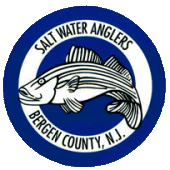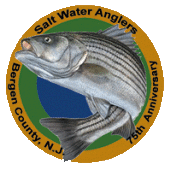Salt Water Anglers of Bergen County, New Jersey
Fishing Regulations Updates
Fishing Management Issues - By John Toth
Fluke - so far I keep hearing that the regulations we had last year
will be the same for this year. More definitive info on fluke
regulations will come out later in February or early March. I will
keep you all posted on it.
At a recent public hearing with the Atlantic States marine Fisheries
that was held to receive input from anglers on what they would like
to see changes in fluke regulations, Paul Haertel, ( past president
of the Jersey Coast Anglers Association) expressed comments that
most in attendance agreed with. They include New Jersey having the
same regulations as NY and Connecticut since we already are in the
same region with them. But for fluke quota purposes, NJ should be in
its own region and not combined with the other two states. We would
most likely end up with a bigger quota for fluke under this new
scenario. Also, the southern region of our state should have a 17
inch size fluke to be more competitive with Delaware that has a 16
inch size limit for fluke. This should help NJ's party/charter
industry that is suffering losses with anglers going to Delaware for
their lower size limit. These are only comments and we have to see
if they are included in future fluke regulations to come.
Sea Bass - The regulations on this fishery has been nothing but
draconian! Each year, our quota is reduced because we are
overfishing it. The quota set for us is too low each year so the
outcome is predictable. Ironically, fishing managers say that they
no idea how many sea bass are in the ocean, but they have to error
on the side of caution and set our quotas low. Anglers are fed up
with this picture and want to make a statement that they are tired
of it. Stay tuned on this one!
Access - The Hackensack Riverkeeper and the NY/NJ Baykeeper sued the
NJ Department of Environmental Protection (DEP) over the DEP's
handling of beach and waterway access. An Appellate Court in
December 2015 ruled that the DEP cannot regulate access since there
is no legislation on the books granting it that authority. In this
void of authority, municipalities could make rules making beach
access for anglers more difficult. Who does the Army Corps of
Engineers report to in regard to beach replenishment? Alarmed, our
legislators quickly passed legislation (1/12/16) giving the DEP this
authority and with our governor's approval on 1/19/16. I have never
seen our legislators pass anything so quickly! If only they could
work together like this on other problems our state is facing like
taxes etc.!
Both the Riverkeeper and the Baykeeper want the DEP to regulate
access, but under better regulations under a bill (S-919) sponsored
by Senator Smith. On January 25th, I attended Senator Smith's
hearing on this issue in Trenton and he asked a number of groups to
get together and work on what they want in his bill for the DEP to
follow in regulating beach and waterway access. I will be working
with this group to improve access and I will keep you updated on its
progress.
Garden State Seafood Association Workshop Report - By John Toth
On December 11th, the Garden State Seafood
Association hosted a Fisheries Workshop and members of the
recreational community were invited to attend it.
It was an all-day meeting and I represented the New Jersey
Outdoor Alliance., There were about 50 people in attendance and they
were from the NJ DEP, Rutgers, National Marine Fisheries (NMFS) and
other organizations that have deep ties to the fishing industry,
both commercial and recreational. There were so many issues
discussed and I cannot begin to put all of it in this column. So, I
will cover just a few major points that may be of interest to you.
The first speaker was Rick Robins, Chairman of
the Mid-Atlantic Fishery Council (MAMFC).
He went quickly through the process of the factors that go
into the development of our quotas. When he was done, the floor was
open to questions.
I said that while
I do not want to be
disrespectful, I said that
"We do not have any confidence in the numbers MAMFC comes out with".
I said that "NOBODY
believes your numbers !" They
are so bad that I refuse to even try to explain them to my Bergen
County fishing club.
While I did not have specific numbers on hand at this meeting,, I
said that how did we catch more fluke during the time period of
Sandy when boats were destroyed and missing.
How are we catching more fluke when boat registrations are
down so bad that our legislature just recently reduced the taxes on
boat sales to spur more people to buy boats!
And how did you come up with a
45% reduction for our
fluke quota in 2016 and that we are so supposed to be so happy that
you are spreading this pain over several years?
Are your numbers so wrong that instead of a
more reasonable 5 % or 10% reduction in our quota you come
out with a whacky 45% reduction!
The livelihood of businesses are on the line while we are
trying to play by the rules of your quotas.
Jeff Reichle, President of Lund's Fisheries said that he
agreed with
me and also
said "we do not need more
data, but the right data ". I
don't think Mr. Robins expected these comments, but
I could not sit still and let this pass without saying
anything! Mr. Robins
responded with something like "we will try harder'.
Pat Sullivan,
Associate Professor from Cornell University working with the
Save Our Summer Flounder staff (SSFFF),
and Eleanor
Bochenek from Rutgers
and representing Science Center for Marine Fisheries (SCeMFIS.org),
reported on their efforts to develop a model that can give a much
better picture of the stocks of summer flounder.
This model will include sex of both male and females, length
of fish and
discard information. All
of this information is to give us a better picture of fluke stocks
that we don't currently have that can be useful in making a case
against the reductions we are currently facing.
Dr. Sullivan reported his new model
is not expected to be in place for 2016, but hopefully in the
near future.
John Manderson from NMFS and Josh Kohut from
Rutgers talked about the difficulty in getting the right data to
develop a good picture of fishery stocks and the time it takes to
decipher what they see and what fishing managers
use to develop our fishing regulations.
They also pointed out that
climate change is altering
their information with fish on the move from their traditional
grounds and moving northward.
2016 - Reduction in Fluke Quota
for next Year by John Toth
Fluke
- The picture for fluke is
Ugly! The Scientific and
Statistical Committee (SSC) of the Mid-Atlantic Fishery Management
Council (MAMFC) has approved a
29 percent reduction in
the allowable biological catch for summer flounder in
2016! What this all means
is a shorter season to catch fluke, a bigger minimum size,
a smaller bag limit, or a combination of all three of these
options. We will have a
better idea of what our 2016 fluke season will look like in the
spring of 2016 when all of the data relating to its quota is
analyzed. No matter how
these cutbacks takes place, they will definitely hurt the for-hire
charter/party boat industry and tackle shops. These cutbacks to
fluke are based on faulty data and we all know this and have lived
with this problem for quite some time.
Bad data going into computer models bring bad results out of
them.
About
seven years ago, a group of recreational anglers, party boat and
for-hire captains and representatives of the tackle industry joined
forces to form a group called
Save the Summer Flounder Fishery Fund (SSFFF) to hire scientists
to take a better look at the data used by fishing managers and come
up with a better model to save the fluke season at the time from
shutting down. Money was
raised by the SSFFF to pay for the scientists to do this analysis.
Given the present situation of dire cutbacks for 2016,
the SSFFF has become active again and wants to hire a
scientist from Cornell University, Dr. Patrick Sullivan, to take
another look at the data that was used to justify the cutbacks we
are about to experience during the 2016 fluke season.
He will try along with other scientists to develop a better
stock assessment model for fluke that can possibly result in
lessening of the 29 % reduction we are facing.
However, the model developed by Dr. Sullivan still has to be approved by the National Marine Fishery Services (NMFS). If he is successful and the results are favorable for recreational anglers, this new model will not come in time to stop or lessen the 29% reduction for the 2016 season. I will be in contact with the SSFFF and will keep this page current on the latest developments concerning the fluke picture for 2016.


